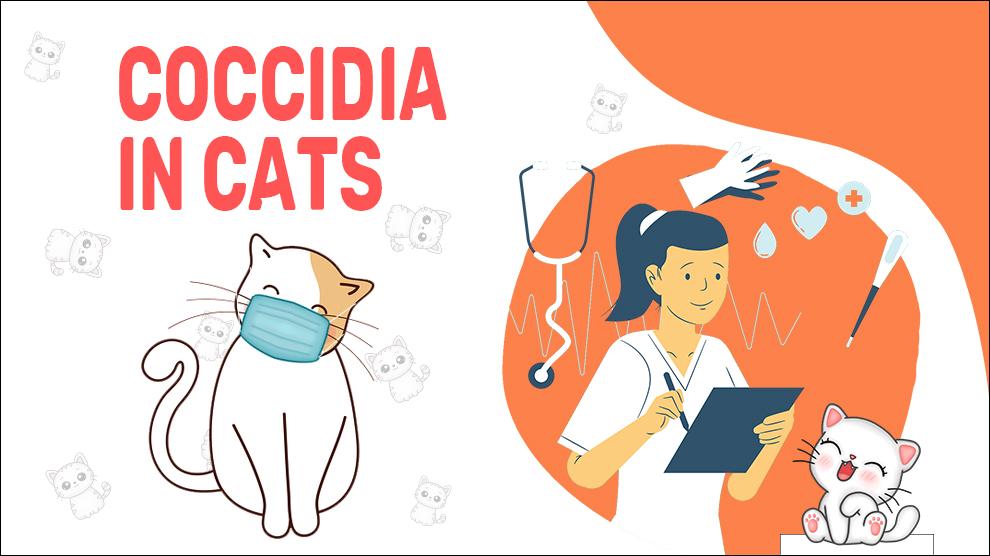What Is Coccidia In Cats?
Coccidia infection in cats is a common parasitic disease that can cause diarrhea, vomiting, and weight loss.
The disease is caused by the ingestion of contaminated feces or soil. The infection can be diagnosed through fecal examination and treated with medication.
Prevention can be achieved through proper sanitation and hygiene.
Clinical Signs Of Coccidia In Cats
The symptoms of coccidia infection in cats can vary depending on the severity of the infection.
Some cats may not show any symptoms at all, while others may display the following:
- Diarrhea: This is the most common symptom of coccidia infection in cats. Diarrhea may be watery or contain blood and mucus.
- Vomiting: Cats with coccidia infection may vomit due to the irritation of their intestinal lining.
- Weight Loss: A coccidia infection can cause weight loss, especially if the cat is not eating well due to diarrhea and vomiting.
- Watery Diarrhea
- Bloody Diarrhea
- Lack Of Appetite
- Loss Of Skin Elasticity
- Sunken Eyes
- Pale Gums
- Abdominal Pain
- Fever
- Mucus Discharge In Eyes
- Squinting In Eyes
- Difficulty Breathing
- Loss Of Balance
- Seizures
- Weakness
Treatment Options For Coccidia In Cats
The treatment of coccidia infection in cats involves the use of medication to kill the coccidia organisms.
Your veterinarian may prescribe a sulfa-based antibiotic or an oral medication to help eliminate the parasites from your cat's system.
Treatment may last for several weeks and may require several rounds of medication.
In addition to medication, supportive care is also important in the treatment of coccidia infection in cats. Your veterinarian may recommend a special diet to help your cat regain lost nutrients and fluids.
It is important to keep your cat hydrated by providing plenty of fresh water and electrolyte-rich fluids, such as Pedialyte.
Home Remedies For Coccidia In Cats
There are no home remedies that can effectively treat coccidia infection in cats.
The infection requires medical treatment with appropriate medication to kill the coccidia organisms and supportive care to help the cat recover.
It is important to seek veterinary care promptly if you suspect that your cat may have a coccidia infection.
How To Prevent Coccidia In Cats?
Preventing coccidia infection in cats can be achieved through proper sanitation and hygiene.
Here are some steps you can take to prevent the spread of coccidia in your home:
- Clean Litter Boxes: Regularly clean and disinfect litter boxes to prevent the buildup of fecal matter.
- Wash Bedding: Wash your cat's bedding regularly to prevent the buildup of fecal matter.
- Disinfect Surfaces: Disinfect surfaces that may come into contact with contaminated feces, such as floors and countertops.
- Prevent Overcrowding: Limit the number of cats in your home to prevent overcrowding and the spread of infection.
Affected Cat Breeds Of Coccidia
Coccidia infection can affect cats of any breed or age, but it is more common in kittens and cats with weakened immune systems.
Kittens are especially susceptible to coccidia infection, as their immune systems are not fully developed and they are more likely to come into contact with contaminated feces or soil.
Causes For Coccidia In Cats
Causes:
Coccidia infection in cats is caused by the ingestion of contaminated feces or soil.
The infection can be spread from one cat to another through contact with contaminated surfaces, such as litter boxes or bedding.
Kittens are more susceptible to infection due to their weaker immune systems.
When To See A Vet For Coccidia In Cats?
If you suspect that your cat may have a coccidia infection, it is important to seek veterinary care promptly.
Your veterinarian will perform a physical examination of your cat and may recommend diagnostic tests such as a fecal examination to confirm the diagnosis.
Once a diagnosis is made, your veterinarian will recommend a course of treatment that may include medication and supportive care.
Food Suggestions For Coccidia In Cats
While there are no specific dietary recommendations for cats with coccidia infection, it is important to provide a balanced and nutritious diet to help the cat regain lost nutrients and fluids.
Your veterinarian may recommend a special diet that is easy to digest and high in protein and nutrients, such as a prescription diet or a homemade diet.
In addition to providing a balanced diet, it is important to ensure that your cat has access to plenty of fresh water and electrolyte-rich fluids, such as Pedialyte.
This can help prevent dehydration and electrolyte imbalances, which can be a complication of coccidia infection.
Conclusion
Coccidia infection is a common parasitic disease that can affect cats of any breed or age.
The infection is caused by the ingestion of contaminated feces or soil and can cause diarrhea, vomiting, and weight loss.
Treatment involves the use of medication to kill the coccidia organisms and supportive care to help the cat regain lost nutrients and fluids.
Prevention can be achieved through proper sanitation and hygiene, such as regularly cleaning litter boxes and disinfecting surfaces.
If you suspect that your cat may have a coccidia infection, it is important to seek veterinary care promptly to prevent the spread of infection and to ensure the best possible outcome for your cat's health.











